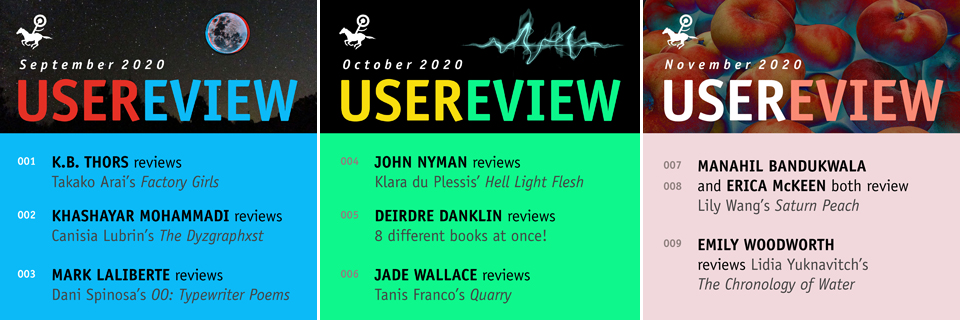
Establishing Experimental Reviews as a Legitimate Genre
After 37 years of existence, two major changes came to CAROUSEL in 2020: (i) we moved our operations completely online; and (ii) we began regularly publishing reviews.
As a bi-annual print journal, we had always shied away from publishing reviews within our pages, feeling that the time gap between any given book’s release date and its eventual review appearance was much too long to be useful to our readers — this significant delay effectively prohibited us from being an active part of the critical conversation around new releases. Now free of the constraining timelines of print existence, CAROUSEL is finally able to feature reviews as quickly as reviewers can read the books, write their responses, and send them to us! For example, Klara du Plessis’ Hell Light Flesh (Palimpsest Press) became available in September 2020 and John Nyman’s review of it appeared on our blog in October 2020.
Our other general hesitancy about book reviews in the past was how frequently bound they are by the conventions of their genre. Rarely playful, frequently prosaic and staid, reviews are often less of a joy to write or to read than we felt they should be. As the first-ever Reviews Editor for CAROUSEL, I suggested to the Managing Editor, Mark Laliberte, that we try something neither of us had ever seen done before in a sustained way: experimental reviews.
‘What would that look like’, we both wondered, ‘and how would it work?’

A Brief History of Experimental Reviews
In “Toward a Wilder Review,” an essay portfolio published by the online poetics magazine Jacket 2 in 2015, editors Laura Goldstein and Michelle Taransky set out to question what “constitutes” a review and to “continue the project of exploring and expanding the notion of the review into wider and weirder territory.” Goldstein and Taransky identify Volta, Lemon Hound and Horse Less Press as examples of venues that have taken up the issue of how to approach reviewing in new ways. The Canadian literary blog Lemon Hound, for instance, historically offered numerous metatextual takes on the nature and craft of reviews.
This project of expanding literary reviews has also been taken up in a somewhat sustained way elsewhere. Pleiades, the famed U.S. bi-annual literary print journal, does explicitly call for experimental reviews but their definition of the concept is notably limited in scope, with their fairly conservative call seeking texts that “border on literary criticism, sometimes personal essay, or sometimes they may get a little postmodern or écriture féminine in their writing style.”
A handful of self-identified experimental reviews have appeared sporadically in other literary magazines over the years …
• though The Capiliano Review’s submission guidelines on their website make little mention of it, their newsletter will inform you that both traditional and experimental reviews are considered
• 3:AM Magazine (an online journal of “radical literature and philosophy”) featured one of Matthew Jakubowski’s fiction-form experimental reviews of Yoko Tawada’s Portrait of a Tongue and another in 2018 of Beatriz Bracher’s I Didn’t Talk
• Joseph Schreiber, the criticism editor for 3:AM, went on to write an experimental verse-form review of his own of Ursula Andkjær Olsen’s Third-Millennium Heart that was published in the online journal Minor Literatures
• Jakubowski, meanwhile, also had an experimental review of Zuzana Brabcová’s Aviaries published in Text Shop Experiments, an annual, online, open-access journal of “innovative and hybrid works” that make use of ‘electracy‘, and another experimental review of Albena Stambolova’s Everything Happens As It Does published by Irish print journal gorse
• the quarterly print journal Overland (self-described as “Australia’s only radical literary magazine”) published Shastra Deo’s lyrical prose experimental review of Cham Zhi Yi’s blur by the (Subbed In, 2019)
My research has turned up no evidence of any literary venue with a commitment to experimental reviews that remotely approaches the length and breadth of vision we have in mind for CAROUSEL’s USEREVIEW section.

What is an Experimental Review?
When our call for experimental reviews went up on August 1, 2020, it was important to set out some parameters to define the concept. For CAROUSEL, the term experimental review includes art or writing in any form that names and meaningfully comments upon a text. This is an open-ended definition and it’s meant to be. There are, specifically, two loose ends here that we feel it is very important to leave untied:
Firstly, the form the experimental review takes is left to the discretion of the reviewer. To date, reviews have come to us in the guises of fiction, poetry, classified ads, vispo, dramatic dialogue and video. We rejoice at the thought that we might, in the future, receive visual art, music, comics or other media we haven’t even considered.
Secondly, the kind of commentary offered by an experimental review on a text is unfixed. There are arguments to be made for reviews that evaluate, reviews that explain, reviews that explore and reviews that perform indescribable other kinds of engagement with books. We are interested in all of these possible functions of reviews.
Experimental Reviews after CAROUSEL
In 2020, a good idea certainly travels fast! We noted some almost immediate lit-scene responses to our USEREVIEW column and its seeding of the idea of experimental reviews into the culture:
• shortly after our call for experimental reviews debuted, The Town Crier (the blog component of Canadian online literary journal The Puritan) premiered a new column called blueberries, in which the co-editor of The Puritan’s reviews section, emilie kneifel, writes short, prose-poetry style reviews of poetry books and chapbooks
• in October 2020, Khashayar Mohammadi — whose poem-review of Canisia Lubrin’s The Dyzgraphxst was part of our inaugural month of USEREVIEWs in September 2020 — began curating Subterranean Chatter, a series of poetry reviews of single poems, for Canadian online literary journal Ice Floe Press
• in November 2020, Canadian literary print journal Canthius published Conyer Clayton’s experimental review-in-verse of Terese Mason Pierre’s Manifest (Gap Riot Press, 2020) and Sanna Wani’s The Pink of the Seams (Penrose Press, 2019) chapbooks
We are, quite honestly, thrilled to see the proliferation of experimental reviews coming in the wake of our USEREVIEW column debut — it’s rare for impact to be so immediate and pervasive. CAROUSEL’s venture into experimental reviews was undertaken in an effort to shift the culture of reviews away from a reliance on the tried-and-true and the expected. The fact that this objective has seemingly resonated with other writers and other journals speaks to the necessity of the broadening of the possibilities for critical writing.

Contribute your Experimental Reviews to CAROUSEL
Want to review a new book in a new way? Look to USEREVIEW first as the ideal venue for your creative-critical literary commentary — we want to see what you’ve got going, and we want to see it NOW! Unlike our poetry and fiction calls, which have dedicated reading periods, our Call for Experimental Reviews is always open. Submissions can be made through our Submittable, which also includes the full submission guidelines.
If you have any questions about experimental reviews, contact me anytime at: [ jade.alyssa.w ( at ) gmail.com ]

Jade Wallace is the Reviews Editor for CAROUSEL.

